(完整版)高中英语重点句型归纳1,推荐文档
- 格式:pdf
- 大小:2.36 MB
- 文档页数:210
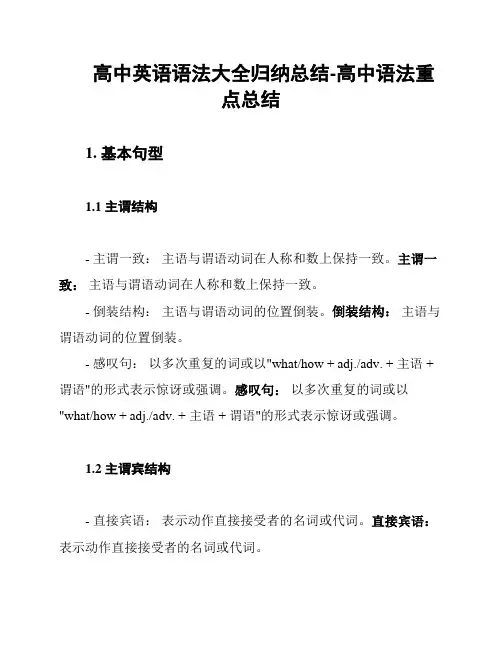
高中英语语法大全归纳总结-高中语法重点总结1. 基本句型1.1 主谓结构- 主谓一致:主语与谓语动词在人称和数上保持一致。
主谓一致:主语与谓语动词在人称和数上保持一致。
- 倒装结构:主语与谓语动词的位置倒装。
倒装结构:主语与谓语动词的位置倒装。
- 感叹句:以多次重复的词或以"what/how + adj./adv. + 主语 + 谓语"的形式表示惊讶或强调。
感叹句:以多次重复的词或以"what/how + adj./adv. + 主语 + 谓语"的形式表示惊讶或强调。
1.2 主谓宾结构- 直接宾语:表示动作直接接受者的名词或代词。
直接宾语:表示动作直接接受者的名词或代词。
- 间接宾语:用来表示动作接受者的人或者事物。
间接宾语:用来表示动作接受者的人或者事物。
- 宾语补足语:用来修饰宾语或者补充宾语的信息。
宾语补足语:用来修饰宾语或者补充宾语的信息。
1.3 主系表结构- 系动词:用来连接主语和表语的动词。
系动词:用来连接主语和表语的动词。
- 表语:用来说明主语状态、性质、特点等的名词、形容词、副词、介词短语等。
表语:用来说明主语状态、性质、特点等的名词、形容词、副词、介词短语等。
2. 时态和语态2.1 时态- 一般现在时:表示经常性、惯性的动作或状态。
一般现在时:表示经常性、习惯性的动作或状态。
- 一般过去时:表示在过去某个时间发生的动作或状态。
一般过去时:表示在过去某个时间发生的动作或状态。
- 一般将来时:表示将来某个时间会发生的动作或状态。
一般将来时:表示将来某个时间会发生的动作或状态。
- 现在进行时:表示正在进行的动作或状态。
现在进行时:表示正在进行的动作或状态。
- 过去进行时:表示过去某个时间正在进行的动作或状态。
过去进行时:表示过去某个时间正在进行的动作或状态。
- 现在完成时:表示过去发生但对现在仍有影响的动作或状态。
现在完成时:表示过去发生但对现在仍有影响的动作或状态。
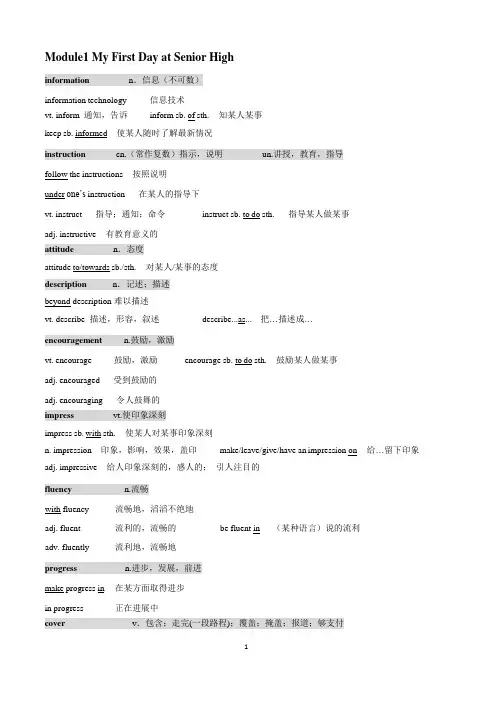
Module1 My First Day at Senior Highinformation n.信息(不可数)information technology 信息技术vt. inform 通知,告诉inform sb. of sth. 知某人某事keep sb. informed 使某人随时了解最新情况instruction cn.(常作复数)指示,说明un.讲授,教育,指导follow the instructions 按照说明under one’s instruction 在某人的指导下vt. instruct 指导;通知;命令instruct sb. to do sth. 指导某人做某事adj. instructive 有教育意义的attitude n.态度attitude to/towards sb./sth. 对某人/某事的态度description n.记述;描述beyond description 难以描述vt. describe 描述,形容,叙述describe...as... 把…描述成…encouragement n.鼓励,激励vt. encourage 鼓励,激励encourage sb. to do sth. 鼓励某人做某事adj. encouraged 受到鼓励的adj. encouraging 令人鼓舞的impress vt.使印象深刻impress sb. with sth. 使某人对某事印象深刻n. impression 印象,影响,效果,盖印make/leave/give/have an impression on 给…留下印象adj. impressive 给人印象深刻的,感人的;引人注目的fluency n.流畅with fluency 流畅地,滔滔不绝地adj. fluent 流利的,流畅的be fluent in (某种语言)说的流利adv. fluently 流利地,流畅地progress n.进步,发展,前进make progress in 在某方面取得进步in progress 正在进展中cover v.包含;走完(一段路程);覆盖;掩盖;报道;够支付similar adj.相似的,类似的be similar to 与……相似be similar in 在某方面相似adv. similarly 同样;类似地n. similarity 类似;相似点(复数similarities)disappointed adj.失望的,感到失望的(人作主语)对某人失望对某事失望adj. disappointing 令人失望的(物作主语)n. disappointment 失望,沮丧to one’s disappointment 使某人失望的是amazing adj.令人吃惊的;令人惊讶的be amazed at/by sb./sth. 对某人或某事感到吃惊vt. amaze 使惊讶,使惊愕amaze sb. 使某人吃惊adj. amazed 感到吃惊的,惊奇的n. amazement 惊愕,惊异to one’s amazement 使某人惊讶的是in amazement 惊讶地enthusiastic adj.热心的;热情的be enthusiastic about 对……热心;热衷于……n. enthusiasm 热心,热情adv. enthusiastically 热心地,热切地far from 离……远;远离by far 大大地;…得多;(修饰比较级和最高级)e.g. He is by far better than Jim.他比Jim 好的多。
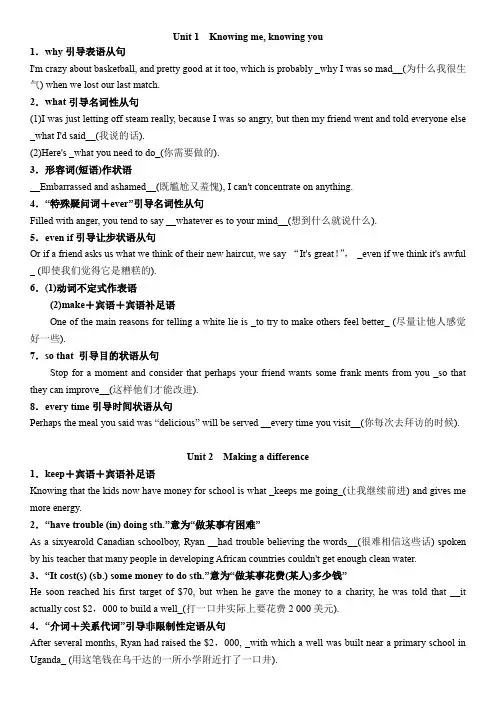
Unit 1Knowing me, knowing you1.why引导表语从句I'm crazy about basketball, and pretty good at it too, which is probably _why I was so mad__(为什么我很生气) when we lost our last match.2.what引导名词性从句(1)I was just letting off steam really, because I was so angry, but then my friend went and told everyone else _what I'd said__(我说的话).(2)Here's _what you need to do_(你需要做的).3.形容词(短语)作状语__Embarrassed and ashamed__(既尴尬又羞愧), I can't concentrate on anything.4.“特殊疑问词+ever”引导名词性从句Filled with anger, you tend to say __whatever es to your mind__(想到什么就说什么).5.even if引导让步状语从句Or if a friend asks us what we think of their new haircut, we say “It's great!”,_even if we think it's awful _ (即使我们觉得它是糟糕的).6.(1)动词不定式作表语(2)make+宾语+宾语补足语One of the main reasons for telling a white lie is _to try to make others feel better_ (尽量让他人感觉好一些).7.so that 引导目的状语从句Stop for a moment and consider that perhaps your friend wants some frank ments from you _so that they can improve__(这样他们才能改进).8.every time引导时间状语从句Perhaps the meal you said was “delicious” will be served __every time you visit__(你每次去拜访的时候).Unit 2Making a difference1.keep+宾语+宾语补足语Knowing that the kids now have money for school is what _keeps me going_(让我继续前进) and gives me more energy.2.“have trouble (in) doing sth.”意为“做某事有困难”As a sixyearold Canadian schoolboy, Ryan __had trouble believing the words__(很难相信这些话) spoken by his teacher that many people in developing African countries couldn't get enough clean water.3.“It cost(s) (sb.) some money to do sth.”意为“做某事花费(某人)多少钱”He soon reached his first target of $70, but when he gave the money to a charity, he was told that __it actually cost $2,000 to build a well_(打一口井实际上要花费2 000美元).4.“介词+关系代词”引导非限制性定语从句After several months, Ryan had raised the $2,000, _with which a well was built near a primary school in Uganda_ (用这笔钱在乌干达的一所小学附近打了一口井).5.“not...but...”意为“不是……而是……”Now, as an adult, Ryan says that the question to ask is _not “Why don't I help?”,but “How can I help today?”_[不是“为什么我不去帮助(别人)?”,而是“今天我该如何帮助(别人)?”].6.独立主格结构These are among the 669 children, _most of them Jewish_(他们大多数是犹太人), that Nicholas Winton will go on to save from death at the hands of the Nazis.7.“on/upon (doing) sth.”意为“一……就……”_On leaving school__(一离开学校), Winton worked in banks in Germany and France.8.as引导非限制性定语从句__As the Chinese saying goes__(正如中国的俗语所说), “A kindhearted person lives a long life.”Unit 3The world of science1.“It suggests that...”意为“这表明……”_It suggests that the present day is a new age for inventions__(这表明当今是一个发明的新时代), but many people might think that the great age of invention is over.2.find+宾语+宾语补足语And now, we _find ourselves in the great new age of technology_(发现自己生活在伟大的技术新时代). 3.with复合结构It is capable of using GPS technology to travel to different places, __with puting technology controlling its “legs”__(利用计算技术控制它的“腿”).4.强调句型So __what is it that__(到底是什么) inspires us to invent things?5.“more than one+可数名词单数”意为“不止一个……”__More than one generation of schoolchildren__ (几代学生) has been amazed by his bravery and his scientific approach to looking for the truth.6.“neither...nor...”意为“既不……也不……”However, __neither the story nor the details of the experiment are entirely true__(这个故事以及实验的细节都不完全真实).7.that引导同位语从句In fact, more than one account suggests that while Newton was certainly inspired by a falling apple, there is no proof __that it hit him on the head_(苹果砸在了他的头上).8.部分否定But in science,facts should be proved by experiments and research, and we __should not always believe_(不应该总是相信) everything we read or hear—even if it is a great story.Unit 4Amazing art1.“It seems (that)...”意为“看起来……”When I look into her eyes __it seems she has a mind of her own__(看起来她好像有自己的思想)! 2.“seem to be doing...”意为“好像正在做……”One moment she ___ seems to be laughing at me__(好像在对着我笑),but then again I catch a sense of sadness in her smile.3.“That/This is/was why...”意为“那/这就是……的原因。
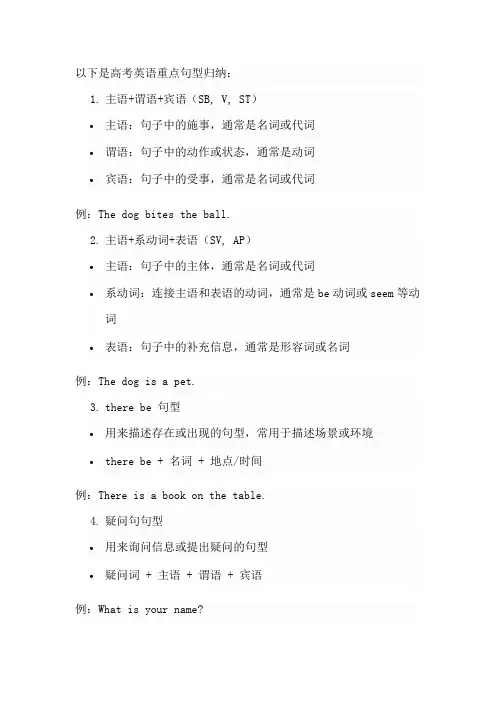
以下是高考英语重点句型归纳:1.主语+谓语+宾语(SB, V, ST)•主语:句子中的施事,通常是名词或代词•谓语:句子中的动作或状态,通常是动词•宾语:句子中的受事,通常是名词或代词例:The dog bites the ball.2.主语+系动词+表语(SV, AP)•主语:句子中的主体,通常是名词或代词•系动词:连接主语和表语的动词,通常是be动词或seem等动词•表语:句子中的补充信息,通常是形容词或名词例:The dog is a pet.3.there be 句型•用来描述存在或出现的句型,常用于描述场景或环境•there be + 名词 + 地点/时间例:There is a book on the table.4.疑问句句型•用来询问信息或提出疑问的句型•疑问词 + 主语 + 谓语 + 宾语例:What is your name?5.祈使句句型•用来表示请求、命令或建议的句型•动词原形 + 其他成分例:Please close the door.6.强调句型•用来强调句子中的某个成分,常用于强调名词、动词、形容词或副词•It is/was + 被强调部分 + that + 其他部分例:It was yesterday that I saw the movie.7.从句句型•用来连接句子或从句子中分离出来的部分,常用于补充信息或修饰主句•从句通常由连接词引导,可以是名词性从句、定语从句或状语从句例:The book that I borrowed from the library is very interesting.(定语从句)。

高中英语语法整理总结组成句子的各个部分叫句子成分。
英语句子成分有主语,谓语,表语,宾语,宾语补足语,定语,状语等。
顺序一般是主语,谓语,宾语,宾语补足语,而表语,定语,状语的位置要根据情况而定。
1、主语主语表示句子主要说明的人或事物,一般由名词,代词,数词,不定式等充当。
He likes watching TV .他喜欢看电视。
2、谓语谓语说明主语的动作,状态或特征。
一般可分为两类:1)简单谓语由动词(或短语动词)构成。
可以有不同的时态,语态和语气。
We study for the people. 我们为人民学习。
2)复合谓语:情态动词+不定式I can speak a little English. 我可以说一点英语。
3、表语表语是谓语的一部分,它位于系动词如be 之后,说明主语身份,特征,属性或状态。
一般由名词,代词,形容词,副词,不定式,介词短语等充当。
My sister is a nurse. 我姐姐是护士。
4、宾语宾语表示动作行为的对象,跟在及物动词之后,能作宾语的有名词,代词,数词,动词不定式等。
We like English. 我们喜欢英语。
有些及物动词可以带两个宾语,往往一个指人,一个指物,指人的叫间接宾语,指物的叫直接宾语。
He gave me some ink. 他给了我一点墨水。
有些及物动词的宾语后面还需要有一个补足语,意思才完整,宾语和它的补足语构成复合宾语。
如:We make him our monitor. 我们选他当班长。
5、定语在句中修饰名词或代词的成分叫定语。
用作定语的主要是形容词,代词,数词,名词,副词,动词不定式,介词短语等。
形容词,代词,数词,名词等作定语时,通常放在被修饰的词前面。
He is a new student. 他是个新生。
但副词,动词不定式,介词短语等作定语时,则放在被修饰的词之后。
The bike in the room is mine. 房间里的自行车是我的。
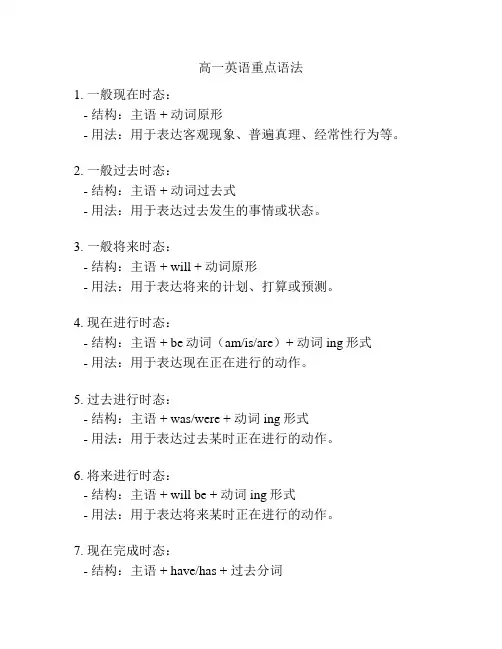
高一英语重点语法1. 一般现在时态:- 结构:主语 + 动词原形- 用法:用于表达客观现象、普遍真理、经常性行为等。
2. 一般过去时态:- 结构:主语 + 动词过去式- 用法:用于表达过去发生的事情或状态。
3. 一般将来时态:- 结构:主语 + will + 动词原形- 用法:用于表达将来的计划、打算或预测。
4. 现在进行时态:- 结构:主语 + be动词(am/is/are)+ 动词ing形式- 用法:用于表达现在正在进行的动作。
5. 过去进行时态:- 结构:主语 + was/were + 动词ing形式- 用法:用于表达过去某时正在进行的动作。
6. 将来进行时态:- 结构:主语 + will be + 动词ing形式- 用法:用于表达将来某时正在进行的动作。
7. 现在完成时态:- 结构:主语 + have/has + 过去分词- 用法:用于表达过去某个时间点之前发生的事情对现在产生的影响或结果。
8. 过去完成时态:- 结构:主语 + had + 过去分词- 用法:用于表达过去某个时间点之前已经完成的动作。
9. 将来完成时态:- 结构:主语 + will have + 过去分词- 用法:用于表达将来某个时间点之前已经完成的动作。
10. 情态动词:- 情态动词 can 表示能力、许可或可能性。
- 情态动词 must 表示必须或推测。
- 情态动词 should 表示建议或应该。
- 情态动词 may/might 表示可能性或许可。
这些是高一英语重点语法的一些例子,掌握这些语法知识可以帮助学生更好地理解和运用英语。
同时,高一的英语语法也涉及到其他更复杂的语法规则和用法,建议学生在平时学习中多多练习和积累,以便提高英语语法水平。
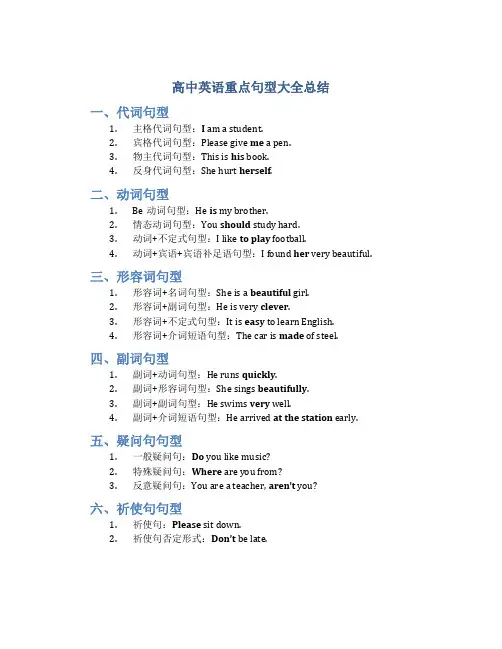
高中英语重点句型大全总结一、代词句型1.主格代词句型:I am a student.2.宾格代词句型:Please give me a pen.3.物主代词句型:This is his book.4.反身代词句型:She hurt herself.二、动词句型1.Be动词句型:He is my brother.2.情态动词句型:You should study hard.3.动词+不定式句型:I like to play football.4.动词+宾语+宾语补足语句型:I found her very beautiful.三、形容词句型1.形容词+名词句型:She is a beautiful girl.2.形容词+副词句型:He is very clever.3.形容词+不定式句型:It is easy to learn English.4.形容词+介词短语句型:The car is made of steel.四、副词句型1.副词+动词句型:He runs quickly.2.副词+形容词句型:She sings beautifully.3.副词+副词句型:He swims very well.4.副词+介词短语句型:He arrived at the station early.五、疑问句句型1.一般疑问句:Do you like music?2.特殊疑问句:Where are you from?3.反意疑问句:You are a teacher, aren’t you?六、祈使句句型1.祈使句:Please sit down.2.祈使句否定形式:Don’t be late.结语以上是高中英语常见的重点句型大全总结,掌握这些句型可以帮助你更准确、流利地表达自己的想法。
在学习英语的过程中,多加练习,不断积累,定能取得更好的进步!。
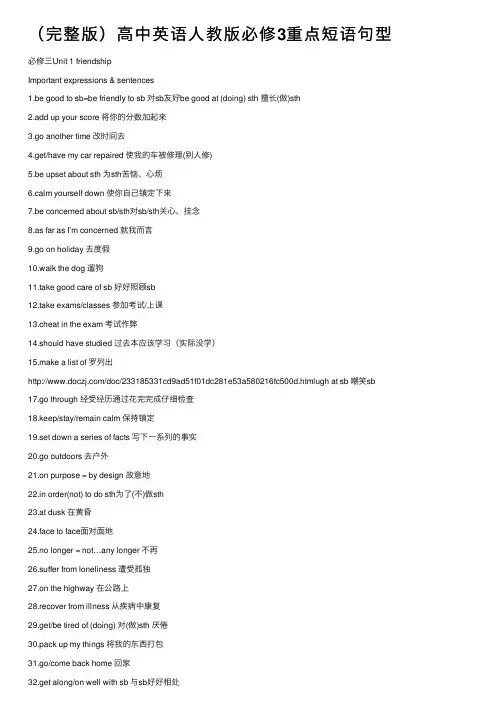
(完整版)⾼中英语⼈教版必修3重点短语句型必修三Unit 1 friendshipImportant expressions & sentences1.be good to sb=be friendly to sb 对sb友好be good at (doing) sth 擅长(做)sth2.add up your score 将你的分数加起来3.go another time 改时间去4.get/have my car repaired 使我的车被修理(别⼈修)5.be upset about sth 为sth苦恼、⼼烦6.calm yourself down 使你⾃⼰镇定下来7.be concerned about sb/sth对sb/sth关⼼、挂念8.as far as I’m concerned 就我⽽⾔9.go on holiday 去度假10.walk the dog 遛狗11.take good care of sb 好好照顾sb12.take exams/classes 参加考试/上课13.cheat in the exam 考试作弊14.should have studied 过去本应该学习(实际没学)15.make a list of 罗列出/doc/233185331cd9ad51f01dc281e53a580216fc500d.htmlugh at sb 嘲笑sb17.go through 经受经历通过花完完成仔细检查18.keep/stay/remain calm 保持镇定19.set down a series of facts 写下⼀系列的事实20.go outdoors 去户外21.on purpose = by design 故意地22.in order(not) to do sth为了(不)做sth23.at dusk 在黄昏24.face to face⾯对⾯地25.no longer = not…any longer 不再26.suffer from loneliness 遭受孤独27.on the highway 在公路上28.recover from illness 从疾病中康复29.get/be tired of (doing) 对(做)sth 厌倦30.pack up my things 将我的东西打包31.go/come back home 回家32.get along/on well with sb 与sb好好相处33.enjoy helping each other 喜欢帮助彼此34.dislike joining in discussions 讨厌加⼊讨论35.fall in love (with sb) 爱上sb36.end the friendship 结束友谊37.ask sb for some advice 征求sb 的意见/doc/233185331cd9ad51f01dc281e53a580216fc500d.htmlmunicate with sb 与sb 交流39.show interests in other people’s ideas 对他⼈的观点感兴趣40.settle down 定居下来1.I am crazy about everything to do with nature.我对⼤⾃然的⼀切感到狂热2.There was a time when a deep blue sky could never have kept me spellbound.曾有⼀段时间蔚蓝的天空不能让我着迷。
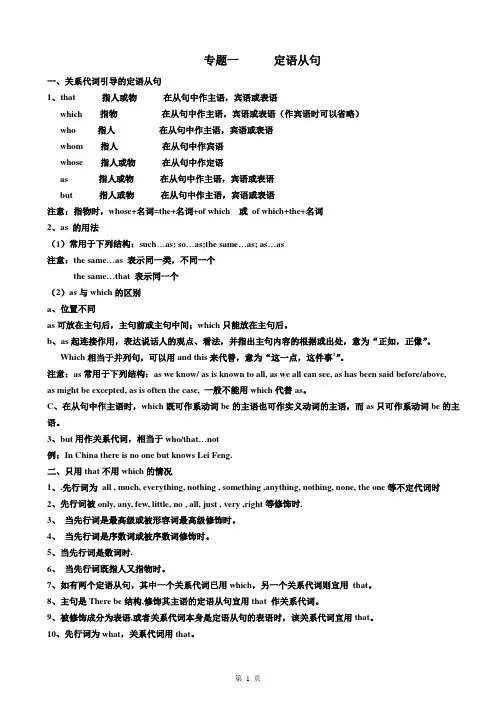
专题一定语从句一、关系代词引导的定语从句1、that 指人或物在从句中作主语,宾语或表语which 指物在从句中作主语,宾语或表语(作宾语时可以省略)who 指人在从句中作主语,宾语或表语whom 指人在从句中作宾语whose 指人或物在从句中作定语as 指人或物在从句中作主语,宾语或表语but 指人或物在从句中作主语,宾语或表语注意:指物时,whose+名词=the+名词+of which 或of which+the+名词2、as 的用法(1)常用于下列结构:such…as; so…as;the same…as; as…as注意:the same…as 表示同一类,不同一个the same…that 表示同一个(2)as与which的区别a、位置不同as可放在主句后,主句前或主句中间;which只能放在主句后。
b、as起连接作用,表达说话人的观点、看法,并指出主句内容的根据或出处,意为“正如,正像”。
Which相当于并列句,可以用and this来代替,意为“这一点,这件事’”。
注意:as常用于下列结构:as we know/ as is known to all, as we all can see, as has been said before/above, as might be excepted, as is often the case, 一般不能用which代替as。
C、在从句中作主语时,which既可作系动词be的主语也可作实义动词的主语,而as只可作系动词be的主语。
3、but用作关系代词,相当于who/that…not例:In China there is no one but knows Lei Feng.二、只用that不用which的情况1、.先行词为all , much, everything, nothing , something ,anything, nothing, none, the one等不定代词时2、先行词被only, any, few, little, no , all, just , very ,right等修饰时.3、当先行词是最高级或被形容词最高级修饰时。
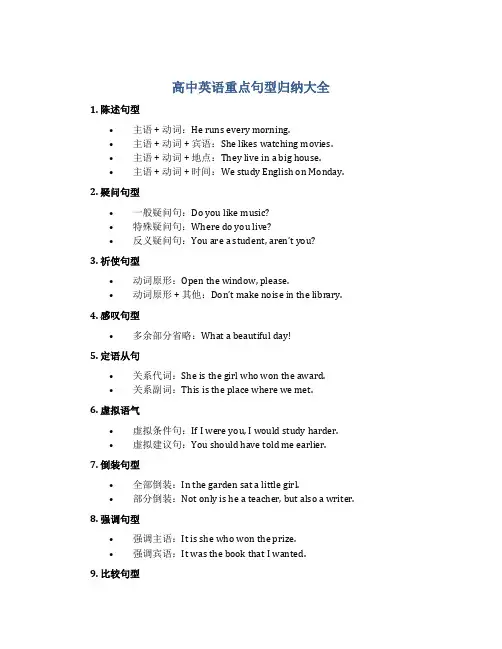
高中英语重点句型归纳大全1. 陈述句型•主语 + 动词:He runs every morning.•主语 + 动词 + 宾语:She likes watching movies.•主语 + 动词 + 地点:They live in a big house.•主语 + 动词 + 时间:We study English on Monday.2. 疑问句型•一般疑问句:Do you like music?•特殊疑问句:Where do you live?•反义疑问句:You are a student, aren’t you?3. 祈使句型•动词原形:Open the window, please.•动词原形 + 其他:Don’t make noise in the library. 4. 感叹句型•多余部分省略:What a beautiful day!5. 定语从句•关系代词:She is the girl who won the award.•关系副词:This is the place where we met.6. 虚拟语气•虚拟条件句:If I were you, I would study harder.•虚拟建议句:You should have told me earlier.7. 倒装句型•全部倒装:In the garden sat a little girl.•部分倒装:Not only is he a teacher, but also a writer.8. 强调句型•强调主语:It is she who won the prize.•强调宾语:It was the book that I wanted.9. 比较句型•表示程度:He is taller than his brother.•表示原因:She is more intelligent than I am.10. 名词性从句•主语从句:What the teacher said is true.•宾语从句:I know what you mean.总结:以上是高中英语中常见的句型归纳,熟练掌握这些句型可以帮助提高英语写作和口语表达能力。
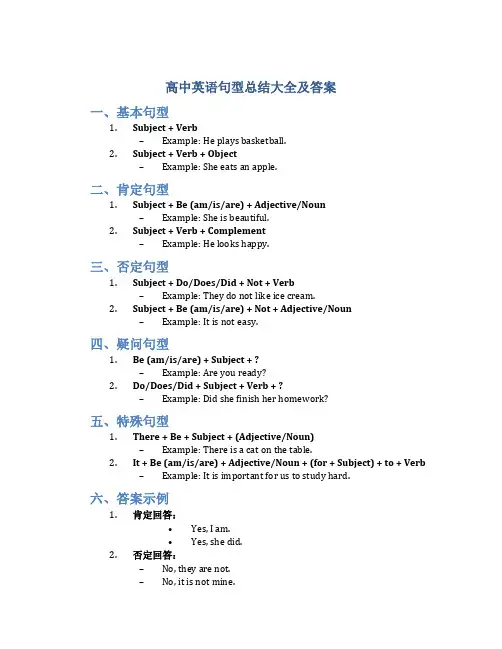
高中英语句型总结大全及答案一、基本句型1.Subject + Verb–Example: He plays basketball.2.Subject + Verb + Object–Example: She eats an apple.二、肯定句型1.Subject + Be (am/is/are) + Adjective/Noun–Example: She is beautiful.2.Subject + Verb + Complement–Example: He looks happy.三、否定句型1.Subject + Do/Does/Did + Not + Verb–Example: They do not like ice cream.2.Subject + Be (am/is/are) + Not + Adjective/Noun–Example: It is not easy.四、疑问句型1.Be (am/is/are) + Subject + ?–Example: Are you ready?2.Do/Does/Did + Subject + Verb + ?–Example: Did she finish her homework?五、特殊句型1.There + Be + Subject + (Adjective/Noun)–Example: There is a cat on the table.2.It + Be (am/is/are) + Adjective/Noun + (for + Subject) + to + Verb–Example: It is important for us to study hard.六、答案示例1.肯定回答:•Yes, I am.•Yes, she did.2.否定回答:–No, they are not.–No, it is not mine.结语以上是高中英语句型总结大全及答案的内容,希望对您有所帮助并提升英语表达能力。
1高考英语常用重点句型归纳1、 as 句型:(1 as引导方式状语从句句型:“按照……;正如……” 例:We do farm work as the old peasant teaches us.(2 as +形容词/副词原级+(a /an +名词+as ; 否定式:not as/so 。
as例:He is as good a player as his sister. (3 the same +名词+as 和……一样的…… (接名词或定语从句例:He is not the same man as he used to be. (4 as 引导非限制性定语从句例:As is known to us, knowledge is power. (5引导时间状语从句。
与 while 意义相近例:We get wiser as we get older. (6 引导原因状语从句,与 because 的用法相近 As it was getting very late, we soon turned back. (7 引导让步状语从句例:Child as he is, he knows much about science. 2、 prefer 句型:(1 prefer doing/to do sth/ sb to do sth 例:I prefer staying/to stay at home.Would you prefer me to stay?(2 prefer to do sth rather than do sth …… 宁愿…...而不愿…".例:I prefer to stay at home rather than go out . (3 prefer doing sth to doing sth例:I prefer watching football to playing it.3、 when 句型:(1 be doing sth when例:He was still smiling when the door opened and his wife came in. (2 be about to do sth when 例:We were about to start when it began to rain. (3 hardly … when…例:Hardly had I got home when it bagan to rain. 4、 seem 句型 :(1 It +seems(to sb + that从句例:It seemed that everyone was satisfied. 例:It seems to me that she is right. (2 There seems to be ----例:There seems to be a heavy rain. (3 It seems as if ----例:It seemed that she couldn't come to class . (4 sb seems(edto do/to be doing/have done sth.5、 what 引导的名词性从句(1 what 引导主语从句例:What surprised me is that everybody seemed to be very indifferent to her. (2 what 引导宾语从句例:We can learn what we do not know. (3 what 引导表语从句例:That is what I want. 6、 too 句型:(1 too. . . to do sth.太。
高中英语归纳总结重点句型英语作为一门语言学科,有许多重要的句型可以帮助我们提高语言表达能力。
在高中英语学习中,归纳总结重点句型是提高学生语言实际运用能力的关键。
本文将就高中英语学习过程中的一些重点句型进行总结,并提供相应的例句。
【一般疑问句】一般疑问句是用来询问某件事情是否属实的句子。
一般疑问句的基本结构是:助动词/系动词+主语+谓语动词+其他?例如:- Do you like sports?(你喜欢运动吗?)- Is she a doctor?(她是医生吗?)【选择疑问句】选择疑问句是用来提供两个或更多选择,并询问对方是否选择其中之一。
选择疑问句的基本结构是:选择词+陈述句句子。
例如:- Would you like tea or coffee?(你想要茶还是咖啡?)- Could you come tomorrow or the day after tomorrow?(你明天来还是后天来?)【反义疑问句】反义疑问句是在陈述句的结尾加上一个疑问的句子,用来征求对方的确认或否定。
反义疑问句的基本结构是:陈述句+一半陈述句的反义/否定形式+附加问句。
例如:- You don't like pizza, do you?(你不喜欢披萨,对吗?)- He is a student, isn't he?(他是一名学生,是吗?)【直接引语和间接引语】在英语中,直接引语和间接引语是用来引述他人的原话或观点的方法。
直接引语直接将原话引述出来,用引号括起来;间接引语则将原话或观点进行转述。
例如:- 直接引语:She said, "I love to read books."(她说:“我喜欢读书。
”)- 间接引语:She said that she loves to read books.(她说她喜欢读书。
)【虚拟语气】虚拟语气用来表达假设、愿望、建议或不可能实现的条件等。
虚拟语气有以下几种形式:- 虚拟语气用于条件句中,表达与现实相反的假设情况。
高中英语重点句型总结一、句型结构在高中英语学习中,学生需要掌握各种句型结构,这些句型对于正确表达自己的意思、理解他人的观点以及进行书面和口头交流都至关重要。
下面总结了一些高中英语重点句型,希望对同学们的学习有所帮助。
二、陈述句句型1. 主语 + 动词 + 宾语•Mr. Smith teaches English to us.•The students study hard for the exam.2. 主语 + 系动词 + 表语•She is a doctor.•The house is big and beautiful.3. 主语 + 动词 + 间宾 + 直宾•He bought his mother a gift.•They lent me their car for the weekend.4. 主语 + 动词 + 宾语 + 宾补•They made him their leader.•We consider her a valuable member of the team.三、疑问句句型1. 助动词 + 主语 + 动词•Do you like playing basketball?•Did they go to the party last night?2. 疑问词 + 助动词 + 主语 + 动词•Where did you go on vacation?•How did she find out the truth?3. 特殊疑问词 + 一般疑问句式•What time is it?•Why are you crying?•Only when you study hard can you pass the exam.•Not until I arrived home did I realize I had forgotten my keys.四、祈使句句型1. 动词原形 + 其他部分•Study hard and you will succeed.•Please be quiet during the lecture.2. Let’s + 动词原形•Let’s go for a walk in the park.•Let’s have dinner together tonight.五、感叹句句型1. How + 形容词 / 副词 + 主语 + 动词•How beautiful the sunset is!•How fast he runs!2. What + 名词 + 主语 + 动词•What a great performance they gave!•What delicious food you cooked!六、复合句句型1. 定语从句•The book that you recommended is very interesting.•The person who helped me was a stranger.2. 名词性从句•I don’t know where he went.•She asked me who the winner was.3. 状语从句•He will go for a walk if the weather is nice.•She watches movies whenever she has free time.4. 宾语从句•She asked me if I wanted to go with her.•I wonder where they are going.以上是一些高中英语重点句型的总结。
高中英语语法大全词法第1章主谓一致一.概念:主谓一致是指:1)语法形式上要一致,即单复数形式与谓语要一致。
2)意义上要一致,即主语意义上的单复数要与谓语的单复数形式一致。
3)就近原则,即谓语动词的单复形式取决于最靠近它的词语,一般来说,不可数名词用动词单数,可数名词复数用动词复数。
例如:There is much water in the thermos.但当不可数名词前有表示数量的复数名词时,谓语动词用复数形式。
例如:Ten thousand tons of coal were produced last year.二.相关知识点精讲1.并列结构作主语时谓语用复数,例如:Reading and writing are very important. 读写很重要。
注意:当主语由and连结时,如果它表示一个单一的概念,即指同一人或同一物时,谓语动词用单数,and 此时连接的两个词前只有一个冠词。
例如:The iron and steel industry is very important to our life. 钢铁工业对我们的生活有重要意义。
典型例题The League secretary and monitor ___ asked to make a speech at the meeting.A. isB. wasC. areD. were答案B. 注:先从时态上考虑。
这是过去发生的事情应用过去时,先排除A.,C。
本题易误选D,因为The League secretary and monitor 好象是两个人,但仔细辨别,monitor 前没有the,在英语中,当一人兼数职时只在第一个职务前加定冠词。
后面的职务用and 相连。
这样本题主语为一个人,所以应选B。
2. 主谓一致中的靠近原则1)当there be 句型的主语是一系列事物时,谓语应与最邻近的主语保持一致。
例如:There is a pen, a knife and several books on the desk. 桌上有一支笔、一把小刀和几本书。
高一英语必修一必背句型翻译详细归纳在高中英语学习中,必修一是非常重要的一册教材。
这本教材涵盖了许多重要的句型,对于学生提高英语口语表达能力和阅读理解能力有很大的帮助。
下面将对必修一中的重要句型进行详细归纳和翻译。
1. It is + 形容词 + that/who + 句子这是一个非常常见的强调句型,常用来强调主语或宾语。
例如:It is important that we should protect the environment.保护环境是非常重要的。
2. There be 句型这是一个用来描述某物或某事存在的句型,其中的 be 动词根据主语的单复数和时态变化。
例如:There is a book on the table.桌子上有一本书。
3. not only... but also...这是一个用来表达两个并列的事物或概念的句型。
例如:Not only does he speak English, but he also speaks French.他不仅会说英语,还会说法语。
4. neither... nor...这是一个用来表达否定选择或否定同时发生的句型。
例如:Neither my father nor my mother is at home.我爸爸和我妈妈都不在家。
5. so + 形容词/副词 + that...这是一个用来表达结果的句型,常用于表示程度或原因。
例如:The movie was so exciting that everyone stood up and applauded.这部电影太令人激动,以至于大家都站起来鼓掌。
6. such + 名词 + that...这是一个用来表达程度的句型,表示非常/如此...以至于...例如:She is such a clever girl that she can solve any problem.她是个非常聪明的女孩,可以解决任何问题。
高中英语重点语法归纳一、时态和语态1. 一般现在时:表示经常性、习惯性的动作或真理。
2. 现在进行时:表示现在正在进行的动作。
3. 一般过去时:表示过去发生的动作或状态。
4. 过去进行时:表示过去某一时刻正在进行的动作。
5. 一般将来时:表示将来要发生的动作或打算。
6. 现在完成时:表示过去发生的动作对现在造成的影响或结果。
7. 过去完成时:表示过去某一时间点之前已经完成的动作。
8. 将来完成时:表示将来某一时间点之前将要完成的动作。
9. 被动语态:表示动作的承受者是主语。
二、句型和从句1. 陈述句:陈述一个事实或描述一个情况。
2. 疑问句:用于询问信息或确认事实。
3. 祈使句:用于表达命令、请求、建议等。
4. 感叹句:用于表达惊讶、赞美、愤怒等情感。
5. 条件句:表示假设条件,常使用if引导。
6. 时间状语从句:表示时间关系,常使用when、while、before、after等引导。
7. 原因状语从句:表示原因关系,常使用because、since、as等引导。
8. 结果状语从句:表示结果关系,常使用so that、so...that、such...that等引导。
9. 目的状语从句:表示目的关系,常使用so that、in order that等引导。
10. 比较状语从句:表示比较关系,常使用than、as...as等引导。
三、名词和代词1. 可数名词:可以用数目词修饰,有单数和复数形式。
2. 不可数名词:不能用数目词修饰,只有单数形式。
3. 可数名词的复数形式:一般在词尾加-s,但也有一些特殊变化。
4. 不可数名词的量词:用some、any、a lot of、much、little等修饰。
5. 人称代词:代替人或事物的代词,有主格和宾格之分。
6. 物主代词:表示所有关系的代词,有形容词性和名词性之分。
7. 反身代词:表示动作反射到自身的代词,有单数和复数形式。
8. 指示代词:用来指示人或事物的代词,有近指和远指之分。